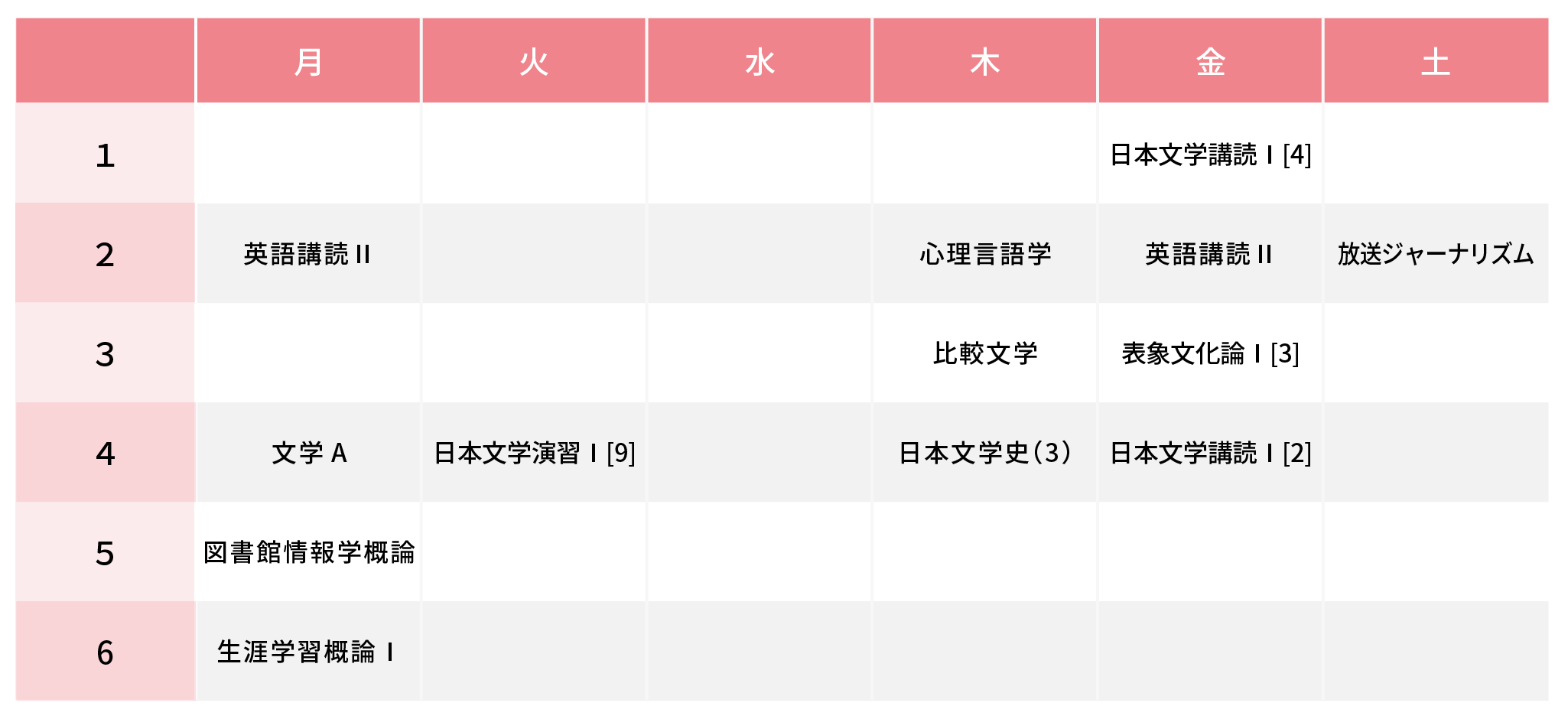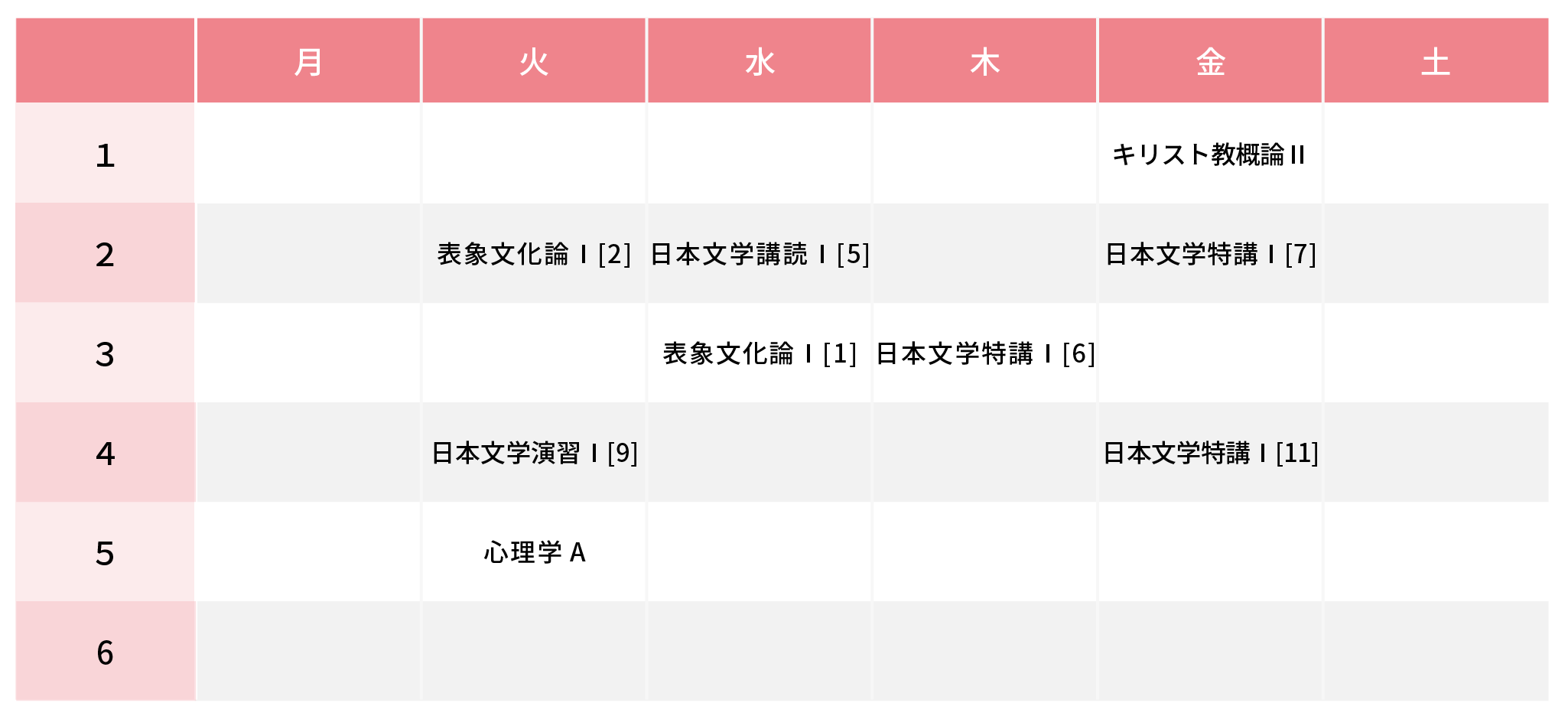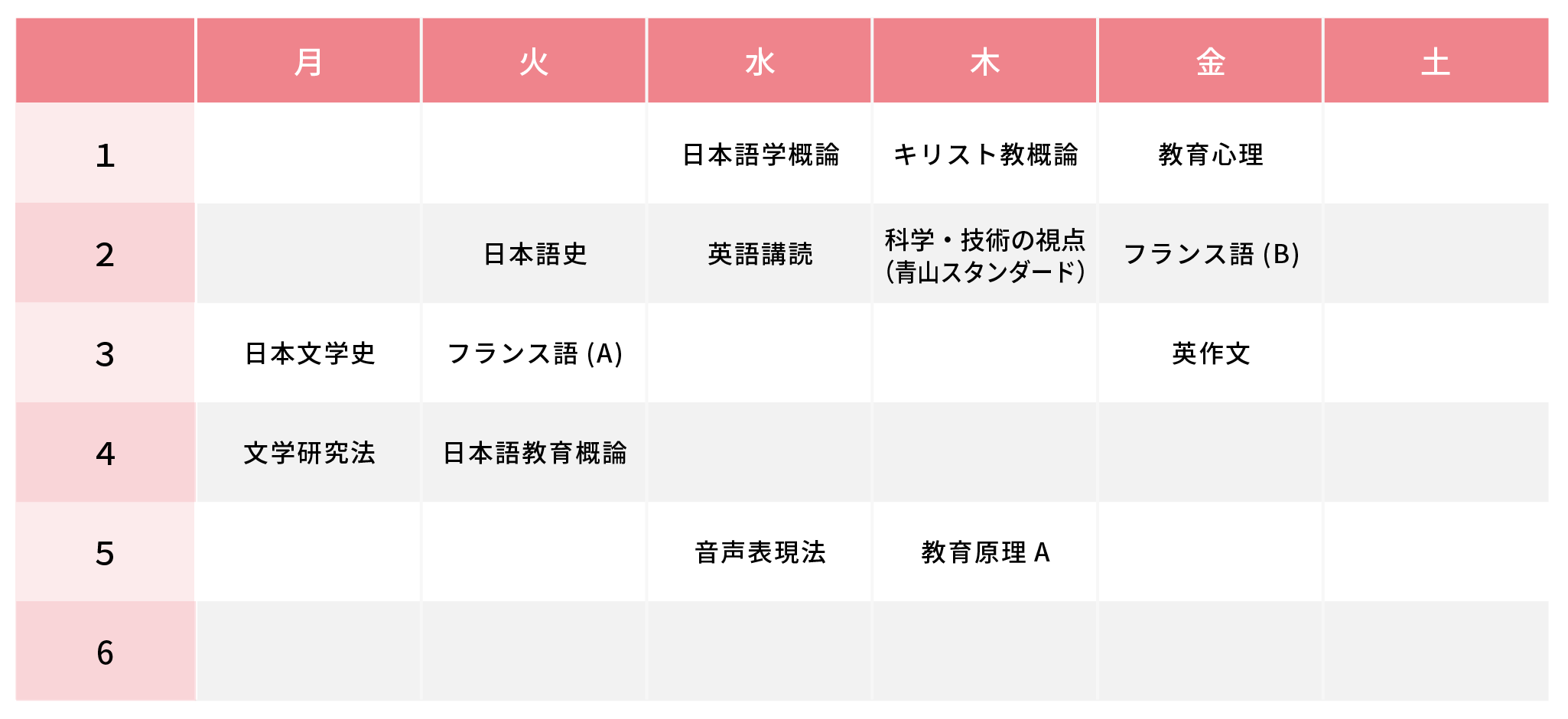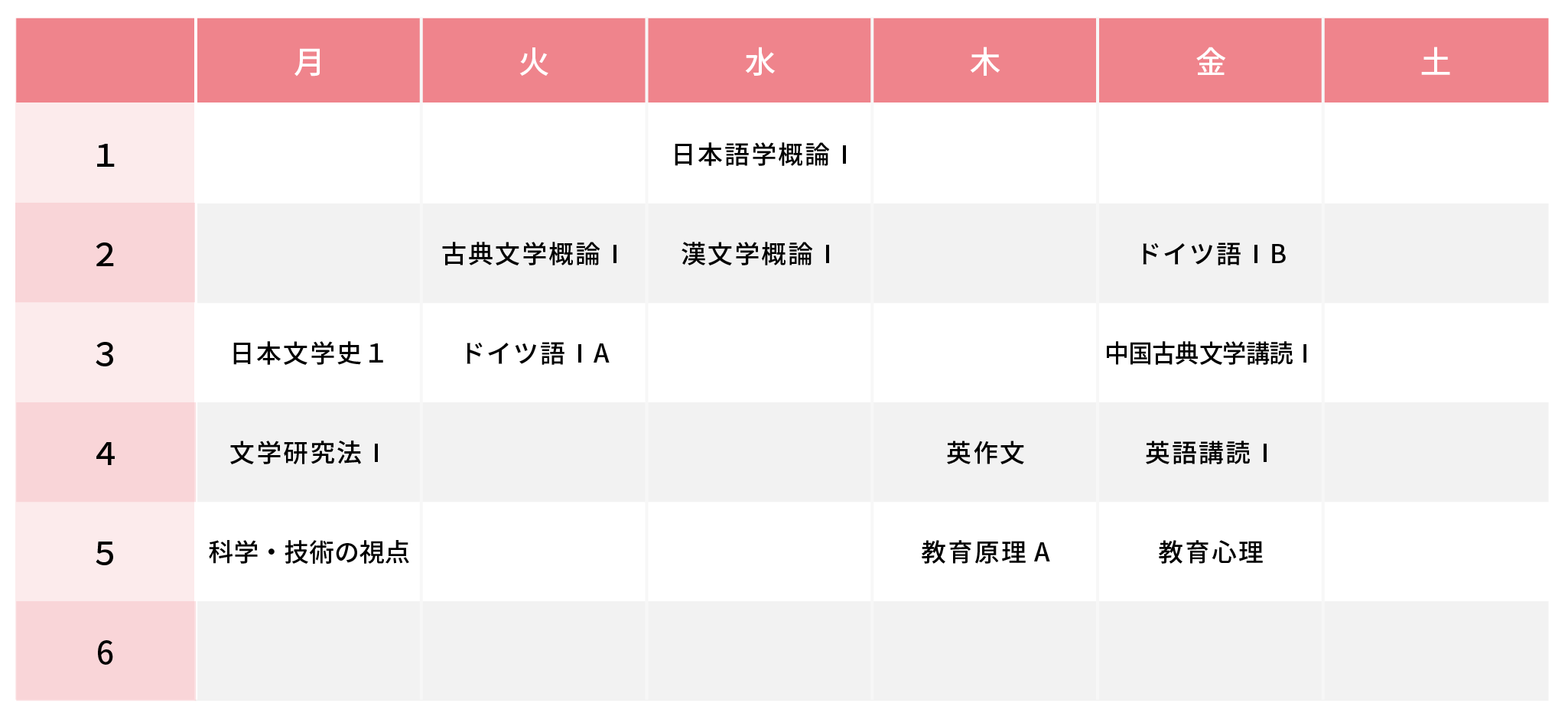A Day in the Life of Department of Japanese Language and Literature (Department of Japanese Language and Literature)
CAMPUS LIFE A Day in the Life of Department of Japanese Language and Literature Student
A day in the literature course
A Friday in the first half of the second year
In the first hour, we will take a real-time lecture on "Japanese Literature Reading I [4]". "Japanese Literature Reading" is a required elective course for the Japanese Literature course. In "Japanese Literature Reading I [4]", we will read the "Kojiki" and "Nihon Shoki". It was very interesting to see the interesting aspects of Japanese mythology and its connections to modern works.
After a 30-minute break, students take the second class, "English Reading II." English is a compulsory subject for first- and second-year students in Department of Japanese Language and Literature, and students take two classes per week. "English Reading" and first-year "Japanese Literature Studies" are taken as a class, so it is a good opportunity to deepen relationships with classmates.
This is the 50-minute lunch break. Last year, we had online classes, so we ate lunch at home. If we had face-to-face classes, we would eat with friends in the cafeteria or classroom. 50 minutes is not enough time to eat outside the school.
The third class is "Representational Cultural Theory I [3]". This is also a required elective for the Japanese Literature course. In this class, we learn about the representation of modern drama. Not only do we understand the story, but we also learn about the reputation of the time. I like theater, so this was a fun class.
The fourth class is "Japanese Literature Reading I [2]." This is also a required elective for the Japanese Literature course. We learn about animals that appear in tales. We look at not only written texts but also picture scrolls and think about how animals are perceived differently depending on the era and place. I took this class because I like cats, and it was really fun to learn about the changes in how cats are perceived.
Although it was a little tough to have four consecutive hours of lectures, it was a fun day immersed in literature. In the Japanese Literature course, there are many electives, so you can choose the field that interests you to study.
Third year, first semester, Wednesday
On Wednesdays, I have two hours of face-to-face classes, so I wake up at 7 and leave the house before 10.
I arrive at the university before 11am and attend lectures.
The second class is "Japanese Literature Reading I [5]". This is a required elective course for the Japanese Literature course. We learn about the history and rhetorical techniques of kyoka. It is interesting because it has a different appeal from waka poetry.
During lunch break, I eat lunch in the classroom with my friends who are taking the third class with me. There is a Seven-Eleven and a store on campus, so you won't have any trouble finding lunch. I especially recommend the bento boxes sold in front of Building 17.
The third period is "Representational Cultural Theory I [1]". This is also a required elective subject for the Japanese Literature course. We learn about Noh and Kyogen. We often watch actual Noh and Kyogen videos, which is fun.
After the third period, we have club activities from 3pm to 5pm. I belong to the Announcement Study Group, and we practice things like reading scripts and radio dramas. We practice twice a week for program presentations that are held several times a year.
In the third year, the only compulsory subjects are "Introduction to Christianity" and "Japanese Literature Seminar," so you can arrange your timetable relatively freely. You can take many lectures in areas of interest such as "Japanese Literature Readings," "Special Lectures on Japanese Literature," and "Representation and Culture Theory," and the lectures every day are very enjoyable.
A day on a language course
One Tuesday of the year
There is no first period today, so instead I will attend the "morning service" in the chapel. Since I am not a Christian, this was my first time attending a service, and the solemn atmosphere was refreshing, unlike that of a university. I also have Christian classes, so sometimes I have to write a report on the service.
Immediately after the service, I went to the second class of "Japanese Language History." This is a required class for the Japanese Language course. Fewer students choose this language course than the literature course, but because it is a required course and there is often overlap in the classes, it is easy to find friends who share the same interests.
During lunch break, I attend a regular meeting of the Department of Japanese Language and Literature Committee. It is a friendly meeting where we discuss our future plans while eating the food we brought with us. Sometimes we eat in the school cafeteria, and sometimes we leave early and eat in the classroom for our next class. If we have time, we might eat outside the school.
The third period is the class for "French (A)", which I chose as my second foreign language. It seems that learning an unfamiliar language is difficult for everyone, no matter what you choose. It may be a good idea to gather information in advance before making your choice. There are grammar-focused classes and communication classes.
It's a bit tough to have so many classes in a row, but the last class for today is "Introduction to Japanese Language Education." This is also a required class for the Japanese Language Studies course. At Aoyama you can also choose a course to complete the Japanese Language Education course. In the coming age of increasing globalization, some of you may be interested in this.
Friday, Year 3
The first class is "Japanese Language Readings[3]". I am taking a class on dialects. It is very interesting that the more years go by, the deeper and more distinctive the lectures become.
The second period is a free time, so I went to the library to borrow materials for my seminar research. In addition to the library, I sometimes use the Department of Japanese Language and Literature 's research lab, commonly known as Nichibunken, for research. During free periods, I go off campus to go shopping or have lunch, or attend IT seminars (self-study classes on PC skills). I also sometimes attend morning worship services in the chapel, a distinctive feature of Aoyama.
It was lunchtime. I met up with a friend in the classroom where my next class was, and we had lunch together. The food at the cafeteria was cheap and delicious, but if you can't get a seat, I recommend eating in an empty classroom or on a bench outside.
The third period is a seminar practice class. At Aoyama, there are many teachers who major in languages, and there are a wide variety of seminars to choose from, making it a very fulfilling experience. Small-group practice classes provide many opportunities for discussion and presentations, allowing for in-depth learning. It is possible to take multiple seminars, and I also belong to a Japanese language education seminar. At Aogaku, you can also choose a course that will allow you to complete the Japanese language education curriculum, and you can also acquire skills that will be useful in the global society of the future.
A day on the teaching course
One Friday a year
Since there is no first period, I wake up a little late at 9:00. I leave home at 10:00 and go to the second period "German IB" class. German grammar and vocabulary are similar to English. It is very interesting to compare it with the English I learned in junior high and high school and discover the differences while studying. Personally, I think it is an easy language to study even for beginners.
After the "German IB" class, it was lunchtime. For lunch, I would invite friends I made in the second period class, or friends from the same department would contact me and we would meet up and eat together. Since we were free to choose where to eat, we would eat in an empty classroom, at the 17th Building or Building 17 Restaurant (Ichinana) 7th Building's basement cafeteria, or on a bench outside when the weather was nice.
The third period was a class called "Chinese Classical Literature Reading I." At university, we study classical Chinese while paying attention to poets and story styles. We covered a wide range of subjects, from the famous poems of Li Bai to the novel that inspired "Sangezuki." Classical Chinese literature has influenced Japanese literature, and one of the attractions of studying it is being able to find the differences between the parts that Japan has adopted and those that have not.
The fourth period is "English Reading I". In my class, we read Sherlock Holmes novels. Since the teachers are different for each class, the materials we use are also different. It's interesting to listen to what the students in other classes are saying because they are studying completely different things.
The fifth period is "Educational Psychology (Secondary)". This is finally a required class for teaching profession. In preparation for becoming a school teacher, we learn educational terminology and study education from a psychological perspective.
The teaching course allows you to obtain a teaching license, so I believe it will be useful for those who want to become teachers in the future.
A day in the life of an international student
Tuesday Day
*Today's first class is "Beginner's Japanese", a class for international students. It is a very important class for international students, as it teaches Japanese terms that are often used in university and everyday life, and allows international students to have discussions in Japanese with each other. It is also a good chance to make friends, as it is structured to help everyone get along. Although the class name says beginner, it actually covers a higher level of Japanese than the Japanese Language Proficiency Test N1, so don't let your guard down and do your best!
*The second hour is a lecture on classical literature.
This is a course where you can learn about a wide range of Japanese classical literature, including the types and characteristics of classical literary works from each era. In class, we sometimes touch on Japanese classical literature that was born from exchanges with other countries such as China and Korea, and there are also opportunities for international students to introduce classical works from their own countries, which makes it a lot of fun.
*It's lunchtime.
Let's have lunch! There are two student cafeterias on campus, each with their own recommended menu. They also sell bento lunches, so it's nice to eat your lunch on a bench on campus. If you don't have a third period class, you can have lunch at a stylish restaurant in Omotesando.
*There are no lectures in the third period today.
You can read books and study in the university library or study room. I like playing the piano, so I often practice the piano in the university's instrumental practice room during breaks between lectures. You can also wander around the campus with friends and chat, or have international exchanges with international students in chat rooms. It's a good idea to think about how to use your breaks between lectures!
*The fourth period is a lecture on Japanese language education.
Since I am aiming to study Japanese language and Japanese language education, classes related to Japanese language education are essential for me. I am very interested in the fact that I can learn Japanese language teaching methods while making use of my experience studying Japanese. Furthermore, if I earn credits for the required subjects, including this one, I can obtain a "Japanese Language Education Course Completion Certificate," so I am taking classes while keeping this in mind for my future job hunting.
*This is finally the last lesson.
The fifth class is a foreign language class, and the foreign language I chose is English. I have spent a long time studying English, but I still want to improve my English at university. Also, I am studying English hard because it will be useful in many ways in my university life.
*All lectures have finished.
I need some reference books to help me write my assignment report, so I went to the library and borrowed some. I want to get home and read the book soon.





